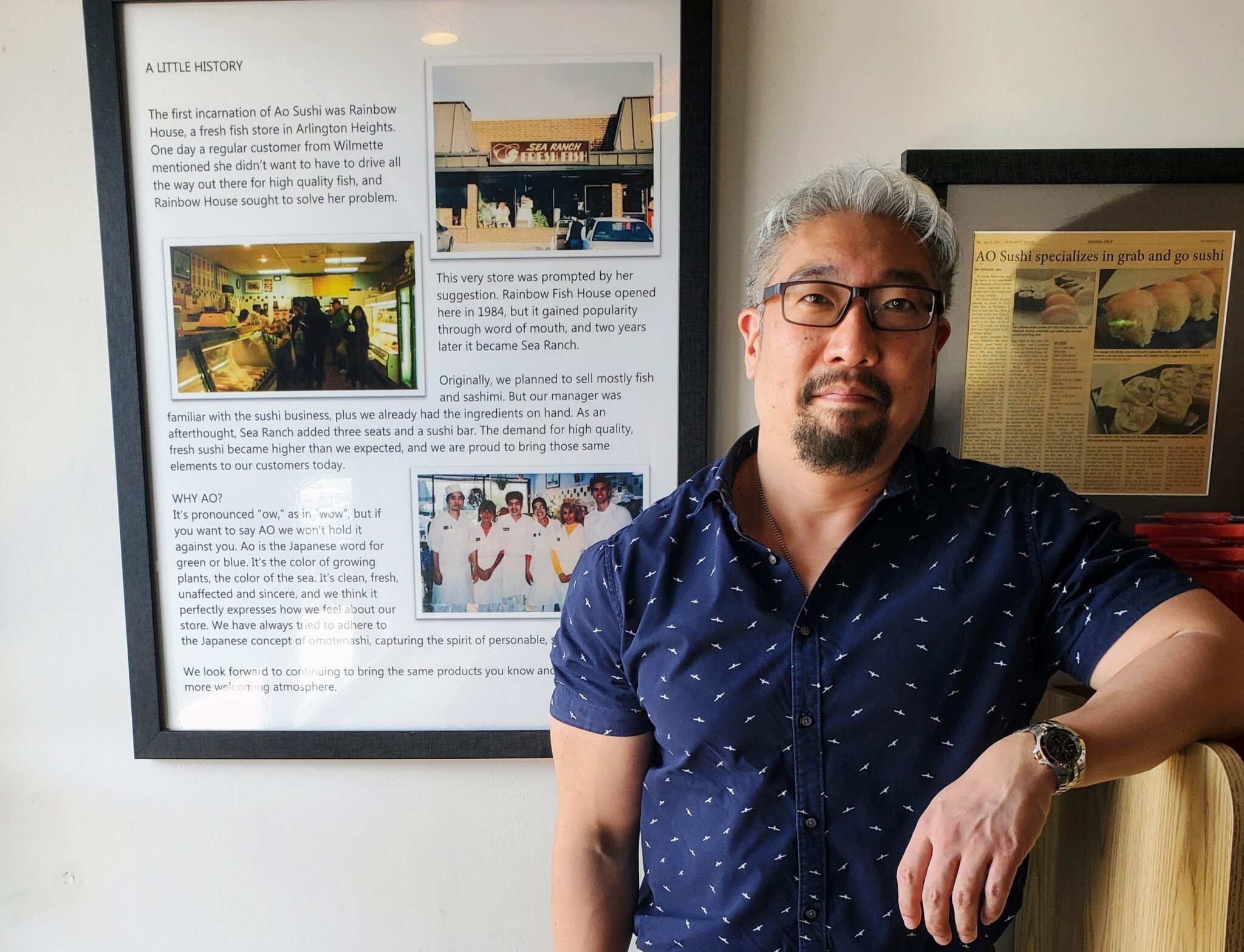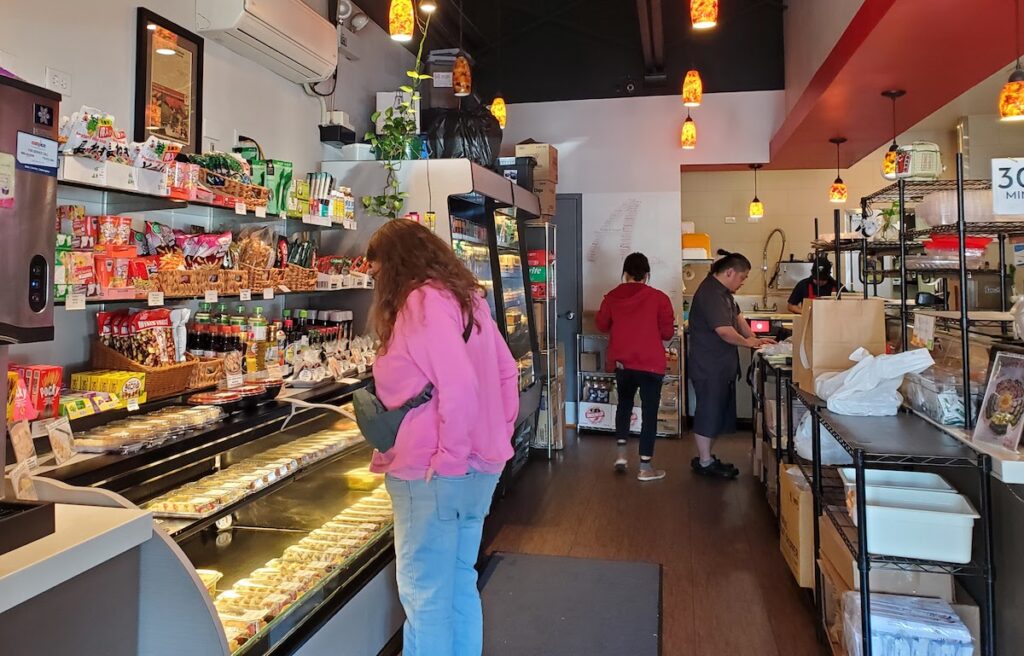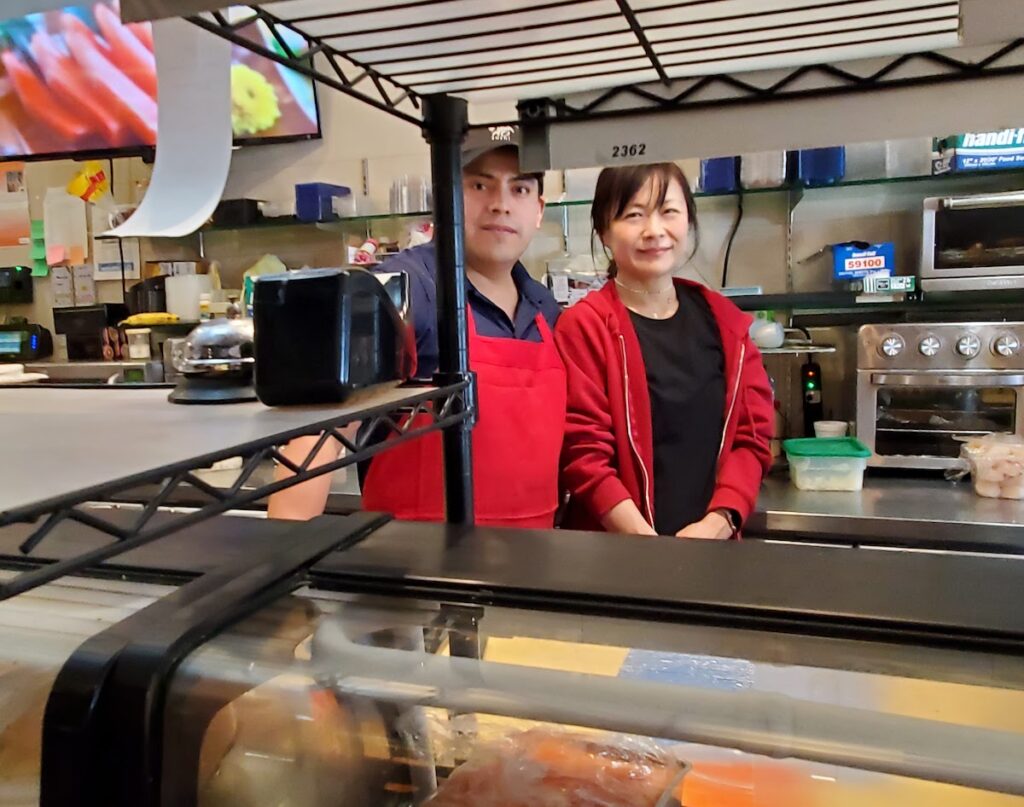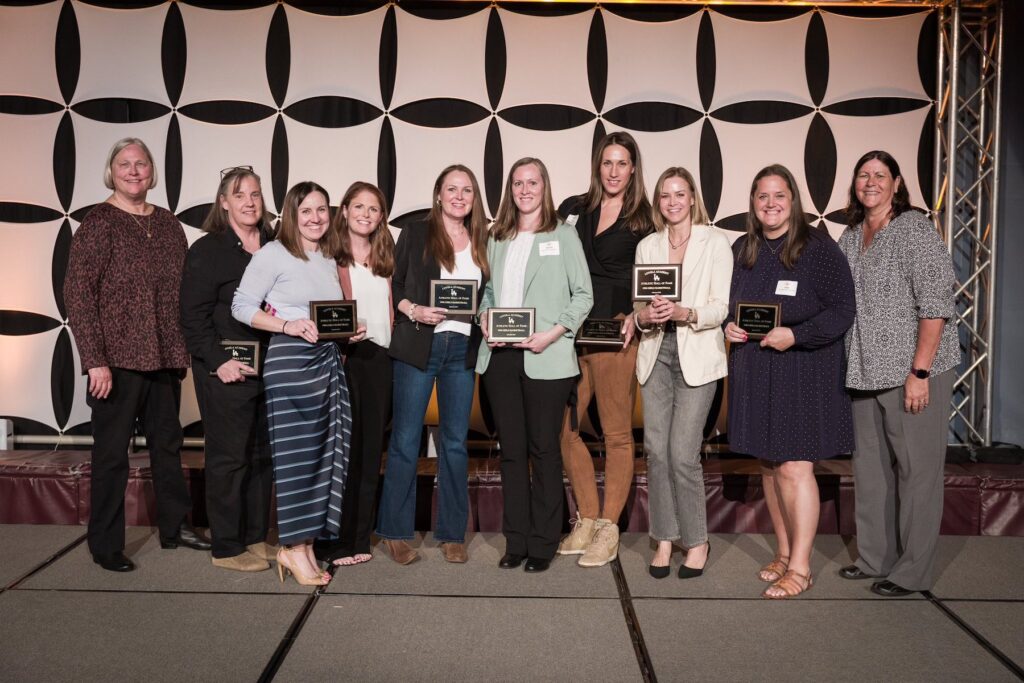
AO Sushi hits 40-year mark in Wilmette
In a post-COVID business landscape littered with restaurant and retail food enterprises that shuttered under the pandemic’s stress, Wilmette’s AO Sushi is a testament to hard work, flexibility and loyal patrons.
For 40 years, the business that provides fish, sushi, and Japanese food and sundries to generations of customers has been located in West Lake Plaza, across from Edens Plaza at 3217 Lake Ave. Originally located three doors down from its current plaza location, it has weathered economic challenges and demographic changes to the clientele that came through its doors.
“This store is a reflection of our customers,” Ken Sato, AO Sushi’s location director, said recently. “I think that’s really what helped us survive, and made us thrive, to be honest.”
From its beginning in 1984, when it debuted at the plaza as Rainbow Fish House, AO Sushi evolved along with its clientele. Sato said its target audience was originally Japanese customers from a large expatriate community whose members came to the Midwest as part of Japan’s business efforts during the 1980s.
Patrons from that community wanted high quality fish they could bring home and came to trust Rainbow Fish House, he added. What they didn’t like, according to AO Sushi’s own history on its website, was having to travel to Arlington Heights, where the store’s parent endeavor, Rainbow House, operated.
A Wilmette customer told Rainbow House staff of her frustration having to travel so far. Store management took her up on the challenge because, in the words of the business’s official history, “There are fish and Japanese food lovers throughout the Chicagoland area, and we wanted to make sure they were fed properly.”
When Rainbow Fish House opened its doors in Wilmette, its initial focus wasn’t the sushi that is now part of its name. At first, the shop almost exclusively focused on Japanese fish, or fish from Asia, such as tuna, salmon and yellow tail; although Sato said it did offer fish species more familiar to the Midwest, such as swordfish.

Sato said that Rainbow Fish House’s renown was based on the quality of the fish it offered. That was (and still is) due at least in part to the fact both stores, as well as a small fish, sushi and grocery store in Evanston, had a parent company: New York-based True World Foods.
Sato said the company, one of the nation’s largest distributors of fresh fish, operates a distribution center in Elk Grove Village. Its proximity to O’Hare Airport means it can bring in extremely fresh fish; it provides much of the fish AO Sushi offers; although the store also buys from other purveyors, Sato said.
As years progressed and sushi’s popularity rose, the owners decided to introduce a small sushi bar at the back of the fish market, he said.
“We set it up just to see how it would go,” Sato said. “It did really well!”
The Wilmette store’s reputation expanded by word of mouth, even without marketing. That happened because potential patrons saw Japanese buyers of both sushi and market fish in the store, he said: “People would see them, and say ‘OK, this is authentic.’”
Sato said Rainbow Fish House’s evolution continued when the market opened a small grocery store in the plaza. That operated successfully until its 2014 closure, a decision Sato said was based on economics. Rainbow Fish House underwent two name changes, first to Sea Ranch (a name still used by its sister store in Evanston) in 1986, and then to AO Sushi in 2014.
Sato said “ao” is the Japanese word for both green and blue, and the latter color references the ocean from which fish are harvested. The name change was part of the then-new group owner’s wish to rebrand the store, maximizing the sushi bar and sushi offerings, but maintaining a smaller fish counter in the rear.
While the business’s name and focus changed, its personnel roster, which now stands at around 25 people, has remained remarkably unchanged. That, too, is a calling card for AO Sushi’s patrons, Sato said.
“These guys are just amazing chefs. I was a sushi chef myself, and I can say they are amazing,” he said. “Jaime (Pujo), our head chef, has been here about 20 years. And there are people who know our fish cutters by name and want to be served by them in particular.”
Longstanding staff means that customers coming in today might remember coming in as children with their parents, he said. That increases the sense of community between staff and clientele. In turn, staff respond to their customers’ suggestions; for instance, creating sushi rolls suggested by those customers.
“We have a roll called the “Beth roll” named after one of our customers. Now she comes in here and she’s happy to say, ‘Yeah, I created that!’,” Sato said.

The most recent change at AO Sushi began in 2015, when management decided to move three doors north in the plaza. They did not, however, want to close up shop while its new location was renovated. Instead, management, including Sato and site manager Keiko Thomas, kept the older location open for business while renovations went on. They were able to open in their current location in 2016, without any interruption in service:
“We didn’t miss a day, because we didn’t want to let anyone down,” Sato said.
The pandemic proved both a challenge and a successful pivot point for the store, as providing sushi trays and similar products for takeout became its major service.
“During COVID, we were pretty slammed with takeout business,” Sato said. “We always did that really well to begin with, and it became even more important. Now, 98 percent of our business is takeout, through our app and through a loyalty program.”
How successful has takeout been? Sato said that while cold weather might not seem to be the best season for sushi and other cold Japanese offerings, Christmas Eve and New Year’s Eve are the two busiest times of the year for the store.
Today, AO Sushi continues to sell its popular sushi and sashimi, top grade fish to create sushi and sashimi at home, as well as cuts of fish that can be cooked or go into soups. Customers can also buy other menu offerings. Japanese pickles and other items necessary to create sushi at home are available, and the store also offers a small number of Japanese non-fish grocery items. They can also dine in at the store’s full sushi bar.
No matter what they choose to do, Sato said, “We’re there for them.”
The Record is a nonprofit, nonpartisan community newsroom that relies on reader support to fuel its independent local journalism.
Become a member of The Record to fund responsible news coverage for your community.
Already a member? You can make a tax-deductible donation at any time.

Kathy Routliffe
Kathy Routliffe reported in Chicago's near and North Shore suburbs (including Wilmette) for more than 35 years, covering municipal and education beats. Her work, including feature writing, has won local and national awards. She is a native of Nova Scotia, Canada.


